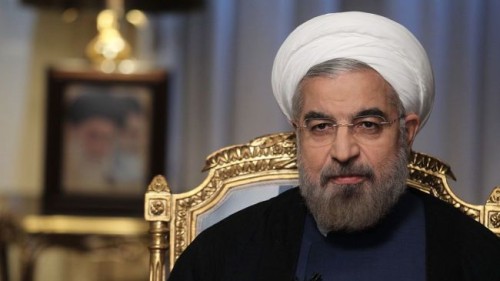In a prime-time interview on State TV on Tuesday night, President Rouhani had a message for the US and its allies.
The President said that Iran is ready for “serious talks” with the 5+1 Powers on Tehran’s nuclear program — as soon as possible — on the basis of mutual respect and trust.
Rouhani was not making any concessions. Indeed, he made clear that Iran will not give up sovereignty and the right to enrich uranium, and emphasized that any agreement must be “win-win”. However, the President signaled that the West could be assured he has the space and authority to reach a settlement:
The preparations have been made on our side. The first measure was for me to decide whether the negotiating body was, like in the past, the Secretariat of the Supreme National Security Council [which reports to the Supreme Leader]….I determined and announced that the Ministry of Foreign Affairs [which reports to the President] would be responsible for nuclear talks….
We are absolutely ready for serious negotiations with the world, both with P5+1 and the IAEA [International Atomic Energy Agency].
The President’s office has also used Rouhani’s English-language Twitter account to put out the message that Iran is “committed to international regulations” over its nuclear program. While this is not a new message for Tehran to give, the President has made sure to emphasize it without burying it in rhetoric.
Iran is committed to international regulations including #NPT & all nuclear activities take place under #IAEA supervision 2/2
— Hassan Rouhani (@HassanRouhani) September 10, 2013
On Wednesday, the President’s office tweeted another message — that the West should not let the opportunity created by Rouhani’s election pass them by:
World should take advantage of opportunity created by election;period for solving #nuclear case will not be unlimited http://t.co/tvdTZvTDKh
— Hassan Rouhani (@HassanRouhani) September 11, 2013
But it is not just Rouhani who is putting out a loud message to Washington and others. In the last 72 hours, Foreign Minister Mohammad Javad Zarif, Speaker of Parliament Ali Larijani, and Ali Akbar Salehi — former Foreign Minister and now head of the Atomic Energy Organization — have all made similar statements.
The outreach is not a new approach for Rouhani, given that the President declared in his campaign this spring that he would pursue “moderation” and “engagement” in his foreign policy. But what has prompted such a big push now?
In a word: Syria.
In recent weeks, Rouhani has found himself maneuvring for authority against hard-liners inside Iran, especially the Revolutionary Guards, who are fighting a propaganda battle against him, including via their media outlet Fars News. The President is also striving to ensure that the Supreme Leader will not intervene and block his efforts.
So far, Rouhani has done quite well. Under his leadership, his Foreign Ministry has taken responsibility for the nuclear brief. Salehi, another key pragmatist, has moved to the Atomic Energy Organization. Talks with the International Atomic Energy Agency on inspection and supervision of Iran’s nuclear facilities have been scheduled for September 27.
However, the Syrian crisis threatens all this progress by taking talks with the 5+1 Powers off the table.
It’s not just that the US and the Europeans say that the time is not right. In its quest to get authority from Congress for airstrikes, the Obama Administration has been loudly proclaiming that such a move would be a deterrent to any use of weapons of mass destruction by Iran.
Rouhani’s strategy on Syria so far has been to stay away from the hard-line rhetoric of others — particularly the Revolutionary Guards — who have openly blamed insurgents for the August 21 chemical weapons attacks, and have declared a foreign plot by the US-Israel-Saudi Arabia and foreign “takfiris” to overthrow President Assad.
If President Rouhani made a public statement along on these lines, he would play into the hands of US hard-liners who claim that Iran, far from wanting a political resolution over its nuclear program, is maneuvering to ramp up confrontation with Washington in the Middle East, and that Tehran is bent on getting a nuclear weapon.
But if the US goes ahead with the airstrikes against Syria, Rouhani’s window for opportunity for progress on the nuclear issue closes. An American military strike will mean he is no longer be able to stand back on Syria. He will have to join the hard-line condemnation of Washington as the driving force behind the Syrian opposition’s goal of removing President Assad.
This is the reason for the urgency in Rouhani’s rhetoric and that of his circle this week. It is an explicit call to Western powers to resume nuclear talks, with an implicit message that those same powers avoid military escalation in Syria.
Is this a line that the President can maintain?
That depends on a number of factors, including whether the U.S. looks set to go ahead with military strikes or whether this week’s gambit by Moscow — that the Assad regime permit international supervision of their chemical weapons stocks — can be turned into a move to avert military action.
Watch for the Rouhani Government to try to move closer to Russia, to ensure that Moscow’s proposal over Damascus’s chemical weapons proceeds and that the Islamic Republic is seen as a participant in that move, even as Moscow has been keeping Tehran on the sidelines in the latest maneuvers.

